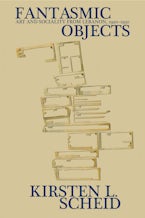- Home
- Public Cultures of the Middle East and North Africa
- Fantasmic Objects
Preparing your PDF for download...
There was a problem with your download, please contact the server administrator.
Fantasmic Objects
Art and Sociality from Lebanon, 1920-1950
Published by: Indiana University Press
374 Pages, 21 color illus., 38 b&w illus.
- eBook
- 9780253064264
- Published: December 2022
$34.99
Other Retailers:
In Lebanon, the study of modern art—rather than power or hierarchy—has compelled citizens to confront how they define themselves as a postcolonial nation.
In Fantasmic Objects, Kirsten L. Scheid offers a striking study of both modern art in Lebanon and modern Lebanon through art. By focusing on the careers of Moustapha Farrouk and Omar Onsi, forefathers of an iconic national repertoire, and their rebellious student Saloua Raouda Choucair, founder of an antirepresentational, participatory art, Scheid traces an emerging sense of what it means to be Lebanese through the evolution of new exhibition, pedagogical, and art-writing practices. She reveals that art and artists helped found the nation during French occupation, as the formal qualities and international exhibitions of nudes and landscapes in the 1930s crystallized notions of modern masculinity, patriotic femininity, non-sectarian religiosity, and citizenship.
Examining the efforts of painters, sculptors, and activists in Lebanon who fiercely upheld aesthetic development and battled for new forms of political being, Fantasmic Objects offers an insightful approach to the history and formation of modern Lebanon.
Preamble
Acknowledgments
Notes on Language
Notes on Sources
1. Introduction: No Art Here
2. Exhibitions: Sociality as Fantasm
3. Nudes: The Citizen as Fantasm
4. Landscapes: The Nation as Fantasm
5. Art Lessons: Fantasmic Formations of the Lady-Artist
6. Portraits: Towards a Fantasmic Ontology of Art Acts
Conclusion: Between Art and Here
Bibliography
Index
Kirsten L. Scheid is Associate Professor of Anthropology in the Department of Sociology, Anthropology, and Media Studies at the American University of Beirut and Affiliated Faculty in the Department of Fine Art and Art History. She is Cofounder of the Anthropology Society in Lebanon (ASIL) in Beirut and Cofounder and Producer of the Hikayat Wala min Bayrut [Stories of a child from Beirut]. She co-curated The Arab Nude: The Artist as Awakener as well as Jerusalem: Actual and Possible, the ninth edition of the Jerusalem Show.
"Scheid's knowledge of Lebanese art, its socio-political context and its historical unfolding are unequal. Her ethnographic immersion in that field is also unequal. What's more, a vast body of comparative and theoretical literature is brought to bear on the subject. The result is a genuinely important work, conceptually innovative, thoroughly educative, and highly stimulating."
~Ghassan Hage, University of Melbourne Future Generations Professor of Anthropology, author of The Diasporic Condition: Ethnographic Explorations of the Lebanese in the World
"Where there is no art, this book finds much that art does. In a place where the ontology of art is seen as belonging to an elsewhere, this book steams the tapestry of complex local art-acts into view. If concerned with the becoming of art and its social consequences in societies overlooked by high modernism and in turn self-belittling, read Kirsten Scheid's book."
~Walid Sadek, Philippe Jabre Endowed Professor in Art, author of The Ruin to Come, Essays from a protracted war
"A highly original, richly textured, and meticulously researched study of three major Lebanese artists and their reception in Beirut. The works of Moustapha Farrouk, Omar Onsi, and Saloua Raouda Choucair come alive in Scheid's evocative prose. Essential reading for scholars of modern art in postcolonial, postwar, and Muslim societies."
~Sonal Khullar, W. Norman Brown Associate Professor of South Asian Studies, author of Worldly Affiliations: Artistic Practice, National Identity, and Modernism in India, 1930-1990
"The most important book about middle eastern art and social life I've read, Fantasmic Objects gives Humanists and Social Scientists a uniquely intra-disciplinary tour de force, that produces new knowledge about Lebanon, its art, modern citizenships, double decolonization, and methods to rethink local art histories. Scheid's brilliant offering of taswir, the polysemic Arabic word for imagination, compels us to rethink what art is and does. You need this book; it will change the way you think. Beautifully written, breathtakingly observed, and nothing less than inspiring, this brilliant book will guide art historical enquires of the global for decades to come."
~Hannah Feldman, author of From a Nation Torn: Decolonizing Art and Representation in France, 1945-1962
"A wonderful, extraordinarily nuanced, and deeply researched historical explanation into the origins of modern art in Lebanon and their complex relationship to urgent questions of citizenship, compatriotship, and secular belonging."
~Ussama Makdisi, author of The Age of Co-Existence: The Ecumenical Frame and the Making of the Modern Arab World
- Fatema Merenissi Book Award
Like the Public Cultures of the Middle East and North Africa series page on Facebook

